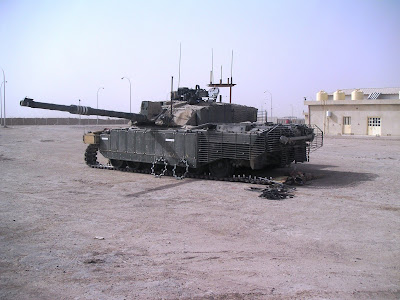Back in late March, I was preparing for something quite different than what I have done the past 2 ½ months. I was called into the colonel’s office and told “things in Basrah have really heated up and everything has changed.” I was then informed that I was to be sent to Basrah to assist a US team in the area, and I would also be working with the Iraqi Army’s 14th Division.
By nature I am a bit of a stick-in-the-mud. I try to get comfortable and find a routine wherever I am. Needless to say, this quite disrupted what I had settled into. I didn’t go kicking and screaming, but I was a bit perturbed. However, I was also interested and couldn’t really complain too much, as there were plenty of others in a lot worse situations than I. When I got to Basrah, the first “Charge of the Knights” had taken place, and the IA was readying for further operations into the city. I was then informed that I would not be staying at the large base at the Basrah International Airport, but moving out to the 14th Division’s HQ, at the then named camp of Mahmud Al Kasim.

I was the only American there. When I arrived there was a single British officer, 2 Lance Corporals and 4 Privates from the 1st Scots Battle Group/Royal Scots Borderers. A much larger Coalition presence was at the Basrah Operations Command. Somehow we managed to feed information to the Multinational Division South-East Headquarters and the US team I was there to support - plus help the 14th Division staff in anyway we could. The British officer was the Operations/Intel brains of the outfit, I was the Logistics and Civil Affairs guy. We both covered any other fields we could – Communications, Personnel, and the like. For one really stressful two day period, I was the only Coalition officer there.
All the while, the US team I was assisting at another location was working their asses off to see that the Iraqi Army was handling its enormous logistical challenges. I don’t know how they managed to keep going sometimes – their work load was staggering.
[Oh, and all during this initial time, some trio of guys who must have thought of themselves as the Jaish Al Mahdi’s version of Davey Crockett kept trying to park 107mm rockets in small camp where I was living … (they met their end at the hands of the Iraqi Army one morning, I think they got a little cocky, and a bit predictable) Some lesser teams of rocket or mortar firers tried to step up and fill the void, but they found out, quite quickly, that you shouldn’t try to shoot at people who have Apache helicopters supporting them.]

Then we started to get more help – a few of the
Jocks (Scottish enlisted soldiers) shuffled around, and we gained a Signaler or two more. We got more British officers on scene to take up the various advisory functions. We also got better and more communications gear, computers, and a couple of vehicles. While all this was starting to take place, the Iraqis had won the Battle for Basrah. Now our job became helping make sure they were able to keep what they had won, and learn from early operations.

The Iraqis paused to mourn their
dead, caught up on some rest, maintenance and refitting – and went back to operations. Their progress is never enough if you hold them to American military standards, but is undeniable by anyone who watched them throughout this time. They are slowly and inexorably gaining strength, experience and an identity of their own. It was elements of three Iraqi Army divisions and two National Police brigades that won in Basrah. We, the Coalition, helped – and I believe that our help kept the casualties and damage down - but make no mistake, this was an Iraqi victory won by the Iraqi Security Forces. The people of Basrah are why the ISF are winning the post-battle too. They have experienced militia/religious fanatic/thug rule and they don’t want any more truck with it. It is the ordinary Abduls, Hattams and Fatimas of Basrah who point out the weapons caches, told the ISF where the JAM and Iranians were hiding, and it is they who are getting to step out into the light at
last.

As I was told back in March, my assignment would not be permanent. I have now left Camp Al Shaheed Wessam and the 14th Division. I will be moving on to a new assignment after I take a couple of weeks of leave. I leave behind a growing and increasingly effective Iraqi Army unit, a very dedicated and hardworking US team nearby, and a serious British Military Transition Team to continue mentoring the 14th.
I may have left Basrah Province in person, but I will always remember the crucible moments in which part of an Army, and part of a Nation were fused together.



















